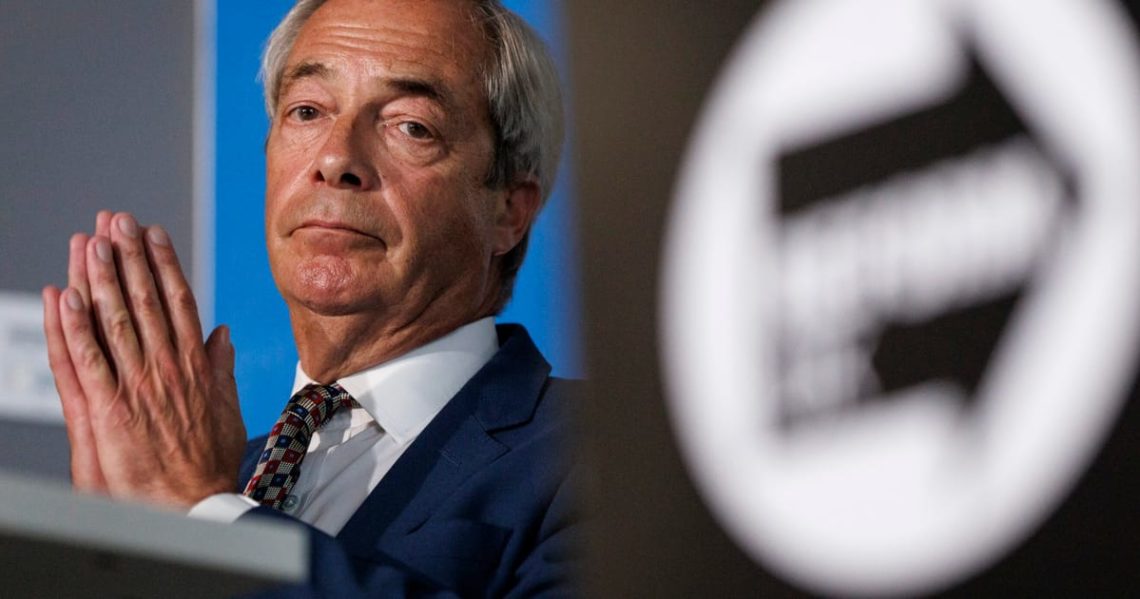LONDON — Family is often considered “the F-word in British politics.”
That’s what Joe Shalam, policy director at the influential Center for Social Justice think tank, calls it — something parties tiptoe around, for fear of being accused of “moralizing about what people should or shouldn’t be doing.”
Yet recently, Reform UK has started to see childbearing as fertile political territory. The party’s mission — in its own words — boils down to bringing back British babies.
Britain needs a “complete 180 shift in attitudes” to improve its birth rate, Leader Nigel Farage said in an interview with the controversial psychologist Jordan Peterson at the right-wing Alliance for Responsible Citizenship (ARC) conference in February.
“We’re trying to cut immigration drastically,” a Reform UK spokesperson told POLITICO. “At the same time, to fix that population crisis, we’re trying to encourage British people already here to have kids.”
Some experts insist government policies have little to no impact on birthrates. But Farage’s populists are backing the rhetoric with policy.
Reform UK is pledging to scrap the two-child benefit cap — a 2017 Tory policy that limits state support to a family’s first two children. The ruling Labour Party, despite pressure from its own backbenchers, has kept the cap in place, citing budget constraints.
Farage has also promised bigger tax breaks for married couples, exempting one partner from paying tax on the first £25,000 they earn. Announcing the move at a press conference, he insisted he wasn’t “moralizing,” but simply trying to make it “much easier for [families] to have children.”
A Gen Z case for babies
The party’s approach to family is one factor drawing in some of its youngest female recruits.
The party’s vote share among women aged 18 to 26 has shot up, according to polling for the More in Common think tank.
Saffron Sims-Brydon, a 22-year-old Reform UK councillor for Derwent and Pont Valley, said that “in theory, when Reform do get in, [she] will be of an age [when she] will want to settle down and have children.”
But the cost of living in the U.K., Sims-Brydon said, has made that difficult for her and the voters in her ward.
“You used to be able to live off one salary,” she said. “Now, it’s an expectation you have to live off two to have a family. The world economically is not great for families, and that’s probably why people want to revert back because the fact is, it doesn’t give you that freedom of choice.”
Britain is grappling with a problem playing out across much of the world: falling birth rates. From Italy to the U.S., right-wing populists have cast the fertility slump as an existential national emergency.
“There’s definitely a gap there in terms of family policy that we’re trying to fill,” confirmed the Reform UK spokesperson.
“At the moment, the issue that we’ve noticed is basically, people don’t feel financially able to have families,” the Reform spokesperson added. “We’ve got a collapsing birth rate in the U.K., well below the rates needed. It’s an existential crisis for our country.”
The U.K.’s population is increasing rapidly, with most of the increase due to net migration. Nonetheless, the Office for National Statistics said in July that the previous year saw more births than deaths in England and Wales.
Wading into welfare
Reform’s family focus is also a strategy that More in Common Research Associate Louis O’Geran says particularly targets voters switching from Labour to Reform.
“Their views on welfare differ from the 2024 Reform base — they are a bit less hardline, and in focus groups some say they moved to Reform partly because of welfare cuts and what they see as government failures to protect vulnerable people.”
Labour’s failure to scrap the two-child benefit cap, along with proposed cuts to PIP disability payments and the Winter Fuel Allowance for pensioners, has angered voters and left a weak spot that Farage “appears well aware [of] and keen to exploit,” says O’Geran.
But Reform is being careful not to stray too far from its anti-welfare message. Reform UK MP Sarah Pochin reiterated Reform will only scrap the two-child benefit cap “for working parents.”
“We’re talking about working parents only,” she said. “We are absolutely not talking about families that are completely on benefits, and therefore we are not supporting a benefit culture, because that is absolutely against what Reform stands for.”
The tightrope
Family-first politics is a risky pitch from the populist right, though, particularly for an anti-woke party haunted by accusations of having a gender problem.
Reform’s mantra — family, community, country — echoes U.S.-style conservatism, though Pochin insists the party is “absolutely not” drawing any culture wars inspiration from across the Atlantic.
“This is just core values stuff,” she said. “Britain has always been a traditional country with traditional family values, and that seems to have been lost.” Pochin went on to say that the government is more interested in “supporting, for example, asylum seekers and housing asylum seekers,” adding that she wants to “get back to our traditions, our culture, our values — and we believe that starts with the family.”
“In the U.K., you guys are a more secular society with religion less politically engaged [in discourse],” explained Patrick Brown, Republican family policy expert at the Ethics and Public Policy Center in Washington.
That secularism matters, politically. If Farage were to adopt a harder line on issues like abortion or gay marriage, for example, “he would risk putting himself at odds with public opinion — including among his own supporters,” warns More in Common’s O’Geran.
Polling backs that up. Fifty-nine percent of Reform voters say same-sex couples should have the right to marry — only slightly behind Labour voters (65 percent) and nearly identical to Conservatives (60 percent).
Instead, the overlap with American family politics lies in economics. “For a long time, Republicans were very good at paying lip service to the family values conversation: abortion, gay marriage, pornography,” said Brown. “[The shift now] is that a lot of the younger voices in the Republican Party who came of age … now are seeing the problems of low fertility and low marriage, and are much more willing to say, ‘let’s experiment with populist economic policies.’”
Shalam sees Reform trying something similar. The party, he argues, is “trying to communicate a commitment across the tax and benefits system to tilt things toward family in a way that they haven’t been tilted in the past.”
Does it even work, though?
Skeptics question whether economic policies focusing on the family are enough to increase the population.
London School of Economics Professor of Public Economics Nicholas Barr said that while countries have tried policies to encourage birth rates — including Hungary’s full income tax exemption for mothers of two or more — “none has much effect.”
Declining fertility stems from multiple factors, he explained, ranging from higher female education and shifting social norms to widely available birth control and lower infant mortality. External events matter too — Russia’s birth rate plummeted after the Soviet Union’s collapse, while post-World War II optimism fueled the baby boom in the West.
“Abolishing the two-child benefit cap is the right policy because of the overwhelming evidence of the centrality of early child development — but it won’t increase the birth rate,” Barr said.
The political position will appeal to some voters nonetheless, says Sims-Brydon, the Reform councilor. “[T]he birth rate is going down, marriages aren’t working out, and there has to be a complete cultural shift — and a lot of Gen Z voters and Reform supporters in general have almost accepted this as something that needs to be done … [to] try and push the population to increase.”
In a bind
That leaves Reform in a bind — treading a fine line between pushing pro-family economics while avoiding cultural conservatism that comes across as too outdated. The party has already begun to show some glimpses of the latter.
On paternity leave, for instance, Pochin said the U.K. needs to “man up and get back to work.”
While not a party policy, she personally is “certainly not a big believer in a massive amount of paternity leave,” adding that “a couple of weeks” would probably suffice.
“How on earth can companies sustain some of these costs?” she said. “They’re being attacked from every which way. The last thing they need is to be told they need to strengthen their paternity leave.”
The post Why Reform sees votes in pledging to bring back British babies appeared first on Politico.




